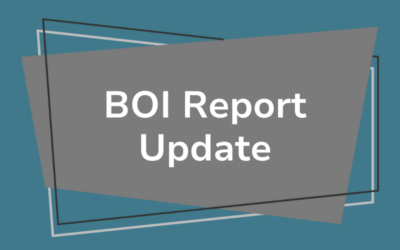Is a recession on the way? While some economic experts believe a recession is on the way, others, such as the National Retail Federation (NRF), think that although the economy is slowing, consumers are financially healthy and a recession is unlikely in 2022. And the United States is still at nearly full employment.
But the recent Small Business Recovery Report by Kabbage from American Express reveals that 83% of small business owners worry that a recession is indeed looming. However, the good news in the report is that 80% of entrepreneurs are optimistic and they believe their small businesses can withstand a recession.
Ironically, surviving the COVID-19 pandemic is what’s making the small business owners confident they can make it through a recession. The COVID-19 pandemic, they report, “helped them find a greater sense of resilience and preparedness to be successful in the future despite economic turbulence.”
Inflation is another challenge that has also helped small business owners prepare. Many small businesses have already reacted to inflation by raising their prices, leaving them with a more solid financial foundation in case of a recession.
Focus on Cash Flow
Many small business owners have dealt with prior recessions, and the advice offered for surviving a recession in 2009 is still relevant today. And it starts with the business maxim that cash is king. While that is true every day you’re in business, during a recession, it’s even more critical to your survival because this is when payments from your customers and clients often start to lag. Net 30 terms quickly become net 60 payments or worse.
To survive a recession, you must keep the cash flowing. First, examine your accounts receivable and payables. How solid is your monthly cash flow today? If you have past-due invoices, call those late-payers and attempt to collect immediately.
Recent inflationary pressures have likely impacted your budgets, and your costs are up. Examine your expenses. Are you subscribing to publications and newsletters you rarely read? Do you belong to organizations you never interact with? How much do you spend on technology apps that are seldom used?
It’s essential to keep your overhead low during a recession. If you are running a virtual business, it may be wise to stay remote until the threat of a recession has passed. Remote companies typically cost less to operate. Make sure you spend wisely and use low-interest credit cards that offer cash back or other rewards.
Focus on Sales
It’s not just the job of your accounting department to maintain cash flow. Yes, monitoring money in and money out is critical. But who’s responsible for the money that comes in? Sales are. So, you must continue to nurture your business relationships with clients and customers. Secure them now. Remember, people do business with people they know, like, and trust. And they tend to stick with trusted relationships in tough times.
Do not reduce the time you spend on prospecting for new clients or on customer attraction strategies. Instead, how can you immediately make your business their “go-to” no matter the state of the economy? Depending on the nature of your business, consider offering extra training or support services or promotional pricing for buying in bulk or paying early.
Diversifying your sales channels is important, as well. While many small businesses increased their online presence during the pandemic, those numbers have declined in the past year. According to the Small Business Recovery Report, in March 2021, online sales accounted for, on average, 57% of small business revenues. However, this has fallen to 40% in the most recent Report.
With gas prices still at record levels, consumers will be keeping a close eye on their spending. They’ll want to drive less and shop more online. So it’s a good idea to diversify your sales channels to reach as many customers as possible, even in a good economy.
Invest in Marketing
Many businesses reflexively cut their marketing spend when money is tight. Don’t do that! In fact, 45% of companies surveyed in the Small Business Recovery Report plan to increase current or add new competitive marketing strategies to stand out among a sea of competitors. They say branding is their primary differentiator. So now is an excellent time to look honestly at your branding. Make sure it reflects your company, looks modern, and that you use it consistently in your workspace, online, and in your marketing materials.
During the Great Recession of 2008, social media was just emerging as a marketing vehicle. Today it’s entrenched in small business marketing plans, as evidenced in the Small Business Recovery Report, which reveals that 44% of businesses now market through social media and digital channels. Make sure you’re registered on all the major social outlets (you don’t need to use them all) and engage on those where you’re likely to find your customers.
The importance of engaging on social platforms is reinforced by the new Q2 2022 Consumer Trends Report from Jungle Scout, which shows how social media and advertising influence consumer purchases.
The report shows:
- 35% of consumers have purchased a product after watching a social media brand’s live stream
- 42% think being followed around the internet by ads is a helpful reminder, while 32% say they are “creeped out” by the retargeting tactic
- YouTube is the still most trusted social media platform for finding and purchasing products, followed by Facebook and Instagram
Get Creative With Hiring
Since the nation is at nearly full employment, hiring is challenging for many small businesses. So instead of hiring full-time employees right now, look to outsource some tasks to freelancers or independent contractors.
If you need full-time or part-time employees, you can likely save money by hiring remote workers in areas where the cost of living is lower. Just don’t forget to check how hiring staff in other states gives you nexus in that state, and make sure to comply with that state’s regulations.
Consider a Line of Credit if Needed
It’s a given that the best time to borrow money is before you actually need it. The businesses surveyed in the Small Business Recovery Report say they already have or plan to apply for a line of credit. Numerous places offer small business lines of credit.
The Small Business Administration (SBA) offers CAPLines, which is an umbrella program that helps small businesses meet their short-term and cyclical working-capital needs.
It features four lines of credit:
- Seasonal CAPLine – Borrowers must use the loan proceeds solely to finance the seasonal increases of accounts receivable and inventory. It can be revolving or non-revolving.
- Contract CAPLine – This line finances the direct labor and material cost associated with performing assignable contracts. It can be revolving or non-revolving.
- Builders CAPLine – This line can finance direct labor and material costs for a small general contractor or builder constructing or renovating commercial or residential buildings. The building project serves as the collateral, and loans can be revolving or non-revolving.
- Working CAPline – This is an asset-based revolving line of credit for businesses unable to meet credit standards associated with long-term credit. It provides financing for cyclical growth, recurring and/or short-term needs. Repayment comes from converting short-term assets into cash, which is remitted to the lender. Businesses continually draw from this line of credit, based on existing assets, and repay as their cash cycle dictates. This line generally is used by businesses that provide credit to other businesses. Because these loans require continual servicing and monitoring of collateral, additional fees may be charged by the lender.
For more information, check out CAPLines.
Remember You’re Not Alone
It’s not a certainty a recession will occur, but you’ll be better able to survive one if you prepare now. It’s also key not to be afraid. Being fearful leads many businesses to reduce or stop investing in their companies, which essentially guarantees you won’t grow and can endanger your survival.
References:
- https://nrf.com/research/monthly-economic-review-july-2022
- https://newsroom.kabbage.com/news/new-kabbage-survey-shows-80-of-u-s-small-businesses-are-confident-they-could-withstand-a-u-s-economic-recession/
- https://www.junglescout.com/consumer-trends/





